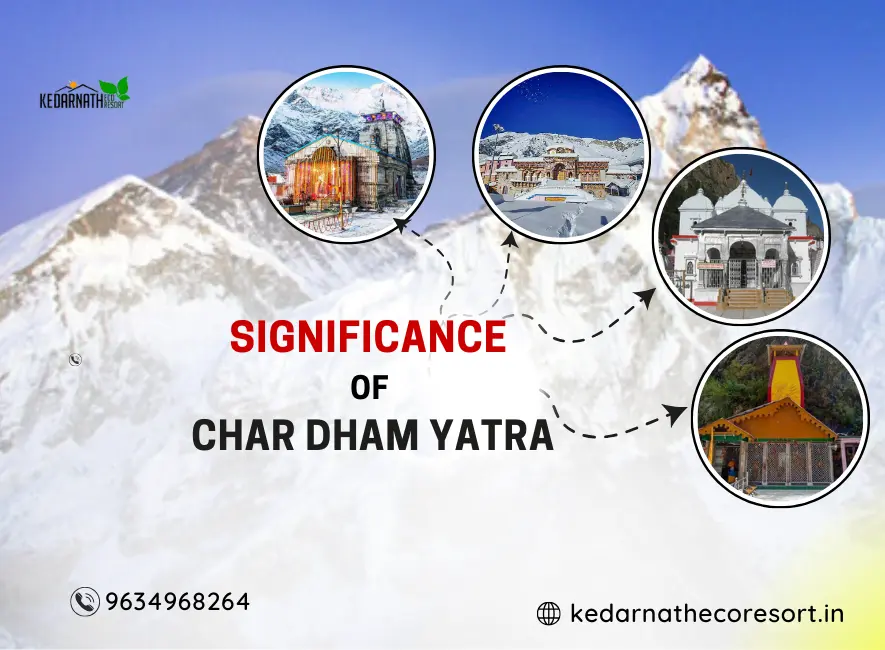Best Significance of Chardham Yatra(Uttarakhand)
The Uttarakhand Chardham Dham Yatra is perhaps one of India’s most well-known pilgrimage routes. The 4 most sacred locations in the Indian Himalayas, known as the Chardham, are accessible to pilgrims every year at roughly the same time. Yamunotri, Gangotri, Kedarnath, and Badrinath are the four locations, and they are all found in the state of Uttarakhand. This pilgrimage, in addition to its religious significance, attracts tourists greatly since it passes through some of Uttarakhand’s most stunning mountainous areas.
History
The Chardham Yatra in Uttarakhand isn’t the first of its name, which is an interesting fact. The four holy shrines Adi Shankaracharya founded in the eighth century AD and placed in four distinct regions of the nation are referred to be the original Chardham. He designated Badrinath, Puri, Rameshwaram, and Dwarka as the Chardham locations. A more condensed route of the pilgrimage, nevertheless, included Yamunotri, Gangotri, Kedarnath, and Badrinath in Uttarakhand, an Indian Himalayan state.
Significance of the Chardham Yatra
The Chardham Yatra is of great holy significance in the Hindu religion. Every Hindu is supposed to make this trip at least once during his lifetime, according to traditional beliefs. This is due to the notion that the Chardham opens the doors to salvation by atoning for lifetime’s worth of sins. It is stated that a pilgrim achieves complete peace of mind after completing the Chardham Yatra.
The significance of four temples
Yamunotri Temple
Goddess Yamuna is the subject of the Yamunotri Temple. From here, the holy Yamuna River flows. Sun’s daughter, the Yamuna, is referred to as the Goddess of Life. She is Yama, the God of Death’s twin sister. Yama assured Yamuna in Bhaidooj that everybody who bathes in the Yamuna River will be saved. He wouldn’t have to experience the agony of Yamlok or Hell.
Gangotri Temple
Ganga is the goddess honored at Gangotri Dham. It is the location of the Ganges River’s beginning. At this point, the Ganges is known as Bhagirathi. Goddess Ganga is thought to have descended from Lord Shiva’s powerful locks. For the purpose of cleansing King Bhagiratha of his misdeeds, Goddess Ganga descended here. The Char Dham Yatra’s second stop is this temple. It is thought that taking a bath in Bhagirathi’s sacred waters aids in salvation.
Kedarnath Temple
Lord Shiva is the subject of the Kedarnath Temple. This temple honors Lord Shiva as Kedarnath, the “Lord of Kedar Khand.” Lord Shiva is thought to have resided here at Nara-request. Narayana’s It is not only the third stop on the Chhota Char Dham Yatra, but it is also one of Lord Shiva’s twelve sacred Jyotirlinga shrines.
Badrinath Temple
Lord Vishnu is the focus of the Badrinath Temple. It is not just the final stop on the Chhota Char Dham Yatra, but it is also its component. It’s also one of Lord Vishnu’s 108 Divya Desams. A Vishnu idol made of black stone is revered in the temple.
Planning about Chardham Yatra
All four of the holy locations are set at heights of more than 10,000 feet in the remote Himalayas. According to the Hindu lunar calendar, the pilgrimage season lasts from May through November, but the months of May and June see the greatest influx of travelers.
At the end of four different pathways, there are four dhams in total. You have the option to go on any combination of the four distinct adventures or select a handful of them to travel on your own. Some pilgrims visit all four holy sites in a single journey, while others travel just to Kedarnath and Badrinath.
Due to the high altitudes, which may cause respiratory problems and Acute Mountain Sickness, the journey is both mentally and physically taxing. If travelling during a busy season, it makes sense to bring your own medications, inhalers, enough warm clothing, blankets, and other necessities.
Opening and Closing Dates of Chardham Yatra
| Temple | Opening date | Closing date |
| Yamunotri Dham | 22 April 2024 | 6 November 2024 |
| Gangotri Dham | 22 April 2024 | 5 November 2024 |
| Kedarnath Dham | 26 April 2024 | 6 November 2024 |
| Badrinath Dham | 9 May 2024 | 10 November 2024 |
Char Dham Route: Yamunotri – Gangotri – Kedarnath – Badrinath
The Char Dham in Uttarakhand exalts the inner beauty of the lush country; millions of views enhance its appeal, and visitors are mesmerized by the breathtaking majesty of nature. Yamunotri, Gangotri, Kedarnath, and Badrinath are the first shrines to be visited during this holy yatra. The path of Char Dham is quite basic and straightforward. There is good connectivity between all roadways.
Char Dham Yatra journey should begin in Rishikesh via the NCR
| Chota Chardham Yatra Road Route | Distance | Duration |
| Delhi – Rishikesh | 230 km | 7 hours |
| Rishikesh – Dharasu | 142 km | 4 hrs |
| Dharasu – Yamunotri | 34km + 8km(trek) | – |
| Dharasu – Uttarkashi | 31 km | 2 hrs |
| Uttarkashi – Gangotri | 100 km | 4 hrs |
| Uttarkashi – Rudraprayag | 180 km | 7 hrs |
| Rudraprayag – Kedarnath | 74 km + 20 km(trek) | – |
| Rudraprayag – Badrinath | 160 km | 6 hrs |
| Badrinath – Rishikesh | 297 km | 6 hrs |
| Rishikesh – Delhi | 230 km | 6 hrs |
FAQs related to Chardham yatra
What significance does the Char Dham yatra have?
Every Hindu is supposed to make this trip at least once during his lifetime, according to traditional beliefs. This is due to the notion that the Chardham yatra opens the doors to salvation by atoning for lifetime’s worth of sins. It is stated that a pilgrim achieves complete peace of mind after completing the Chardham Yatra.
The Chardham Yatra is scheduled to start when?
Every year, the Akshaya Tritiya, which falls somewhere between the middle of April and the beginning of May, is when the Chardham Yatra officially kicks off.
How to get there?
The best method of transportation to get to Haridwar from Delhi is via bus or rail. You must take a cab or a bus from Haridwar to Barkot, which is the town closest to Yamunotri. Starting in Yamunotri, you can travel to Gangotri, Kedarnath, and then Badrinath as part of the Char Dham Yatra.
When is the most advantageous and secure time to start this holy Yatra?
The Yatra lasts for six months, however due to the shrines’ bizarre placements; it is unsafe to visit throughout that time like monsoon (July- August). So, April to June and then September and October are the two busiest times to start this sacred Yatra



